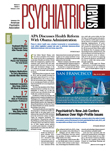It's not just donuts that can put a “donut” around your middle. Depression, or the physiological changes that result from depression, may be able to do so as well.
This is the message from a study conducted by Dutch and American researchers published in the December 2008 Archives of General Psychiatry.
The study included more than 2,000 community-dwelling older individuals (aged 70 to 79) living in the Memphis, Tenn., and Pittsburgh areas. They were evaluated at the start of the study for depression. Also at that time, and five years later, they were assessed for both overall obesity and abdominal obesity.
The yardsticks used to measure overall obesity included body mass index and percentage of body fat as measured by dual-energy X-ray absorptiometry. The yardsticks used to measure abdominal obesity included waist circumference and visceral fat as measured by computed tomography.
Finally, at the end of five years, the researchers looked to see whether there were any links between baseline depression and the later development of either overall obesity or of abdominal obesity, after taking sociodemographics, lifestyle, diseases, and other possibly confounding factors into consideration.
The researchers found no significant link between baseline depression and later overall obesity. But they did find a link between baseline depression and abdominal obesity.
“The most important finding was that older individuals with depressed symptoms were twice as likely to gain visceral fat as were nondepressed older persons,” Nicole Vogelzangs told Psychiatric News. Vogelzangs, the study's lead investigator, is a doctoral student at VU University Medical Center in Amsterdam. The results suggest that “depression may promote visceral fat accumulation,” Vogelzangs and her group wrote in their study report.
One could argue that depression leads to abdominal obesity because depressed people tend to have unhealthy lifestyles. However, the researchers do not think that this argument holds since they took lifestyle factors, such as smoking, alcohol use, and a reduced level of physical activity, into consideration during their analyses. True, the researchers did not factor in diet, but if overeating led to abdominal obesity, then it should also have led to overall obesity, they reasoned.
“There are many studies showing a cross-sectional relationship between depression and obesity—that is, people with depressive symptoms or depressive disorders are more overweight or obese—and a smaller number of studies showing a longitudinal relationship—that is, people with depressive symptoms or depressive disorders are more likely to become overweight or obese,” Gregory Simon, M.D., told Psychiatric News. “What's new here is the finding that depression is linked to increases in abdominal fat.” Simon, a psychiatrist and researcher at the Group Health Center for Health Studies in Seattle, has studied the relationship between depression and obesity (Psychiatric News, September 16, 2005).
This new finding is important for two reasons, Simon explained.“ First, abdominal fat is much more strongly associated with developing serious health problems like diabetes and heart disease than is obesity in general. Second, this finding suggests that hormonal changes, especially increase in stress-related hormones, may explain how depression increases risk of obesity and obesity-related health problems.”
Indeed, some studies have shown that depression, at least in a subset of patients, leads to elevated concentrations of the stress hormone cortisol, and that cortisol can promote the accumulation of visceral fat by activating the enzyme lipoprotein lipase and by inhibiting lipid movement.
Some crucial questions about the subject still remain to be answered. For example, can depression fatten the “middles” of middle-aged people as well as of seniors? And how often, and for how long, must one be depressed to put one's abdomen in jeopardy of expansion?
The study was funded by the U.S. National Institutes of Health and the Young Academy of the Royal Netherlands.
